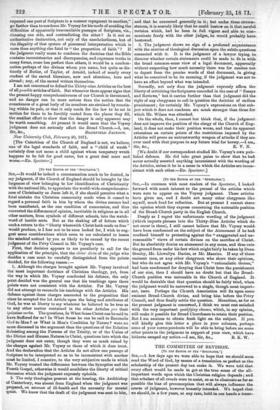[TO THE EDITOR OF THE "SPECTATOR. ")
Stn,—It would be indeed a consummation much to be desired, in my judgment, if the Church of England should be brought by the largeness of view belonging to her identification of Christianity with the national life, to appreciate the world-wide comprehensive- ness of Christianity as Jesus left it, if she should perceive what a fatal mistake the Christian community made when it ceased to regard a personal faith in him by whom the divine essence had been manifested, as the one condition of communion, and thus converted the differencesof opinion, inevitable in religious as in all other matters, from symbols of different schools, into the watch- word of hostile sects. But as the shaking off of fetters which such a return to the " liberty wherewith Christ hath made us free " would produce, is I fear not to be soon looked for, I wish to sug- gest some considerations which seem to me calculated to lessen the mischief noticed by you as likely to be caused by the recent judgment of the Privy Council in Mr. Voysey's case.
First, that decision appears to me peculiarly to call for the application of the principle, that the obiter dicta of the judge who decides a case must be carefully distinguished from the points decided, for the following reason :— 1. Although the charges brought against Mr. Voysey involved the most important doctrines of Christian theology, yet, from the way in which Dlr. Voysey conducted his defence, the only point decided was the general one that his teachings upon these points were not consistent with the Articles. For Mr. Voysey did not attempt to reconcile his teachings with the Articles. His defence against these charges amounted to the proposition that since he accepted the 1st Article upon the being and attributes of God, he was at liberty to say whatever he believed to be true as to any other matter contained in the other Articles pro their ipsissima verba. The questions, In What Sense Christ can be said to have Suffered for us ? In What Sense he can be said to Reconcile God to Man ? or What is Man's Condition by Nature ? were no more discussed in the argument than the questions of the Relation Subsisting among the Persons of the Trinity, or of the Union of the Divine and Human Natures in Christ, questions into which the judgment does not enter, though they were as much raised by the charges against Mr. Voysey as those of which it does treat. And the declaration that the Articles do not allow one passage of Scripture to be interpreted so as to be inconsistent with another must be limited, I conceive, to the very subjective mode in which Mr. Voysey treated the differences between the Synoptics and the Fourth Gospel, otherwise it would annihilate the liberty of critical discussion which the judgment expressly upholds.
2. The only theologian present at the hearing, the Archbishop of Canterbury, was absent from England when the judgment was prepared, on account of ill-health and the necessity for mental quiet. We know that the draft of the judgment was sent to him, and that he concurred generally in it; but under these circum- stances, it is scarcely likely that he could bestow on it that careful revision which, had he been in full vigour and able .to com- municate freely with the other judges, he would probably have. bestowed.
3. The judgment shows no sign of a profound acquaintance with the niceties of theological discussion upon the subtle questions connected with it. It is the judgment of a lawyer trying to discover whether certain statements could be made to fit in with the broad common-sense view of a legal document, apparently without suspecting how much necessity there was for caution not to depart from the precise words of that document, in giving what he conceived to be its meaning, if the judgment was not to have an effect beyond what was intended.
Secondly, not only does the judgment expressly affirm the liberty of criticizing the Scriptures conceded in the case of " Essays and Reviews," but it carries further than that judgment did the right of any clergyman to call in question the doctrine of endless punishment ; for certainly Mr. Voysey's expressions on that sub- ject which it does not condemn are much stronger than those for- which Mr. Wilson was attacked.
On the whole, then, 1 cannot but think that, if the judgment• does not improve the position of the clergy of the Church of Eng- land, it does not make their position worse, and that its apparent extensions on certain points of the restrictions imposed by the- Articles will prove an untrustworthy weapon of attacks if they are ever used with that purpose in any future trial for heresy.—I am,.
[We doubt if our correspondent studied Mr. Voysey's own pub- lished defence. He did take great pains to show that he had. never actually asserted anything inconsistent with the wording of the Articles, unless it be in a sense in which the Articles are incon- sistent with each other.—En. Spectator.]


































 Previous page
Previous page